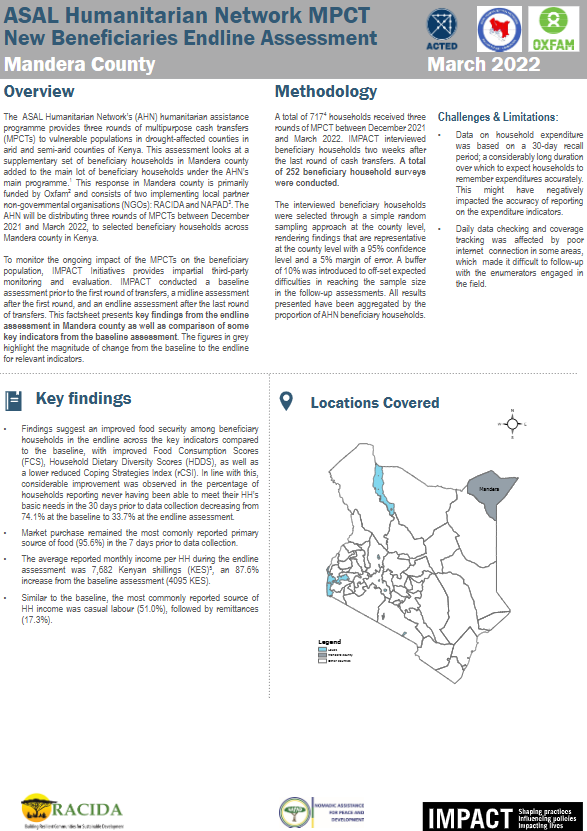ASAL Humanitarian Network (AHN)
ASAL Humanitarian Network – Drought Response Results
Cash Assistance Improves Food Security and Reduces Coping Pressures in Mandera County
Endline Assessment – March 2022
The ASAL Humanitarian Network (AHN), with support from Oxfam and its affiliates, implemented three rounds of multi-purpose cash transfers (MPCT) between December 2021 and March 2022, targeting drought-affected households in Mandera County. The programme, implemented by Nomadic Assistance for Peace and Development (NAPAD) and Rural Agency for Community Development and Assistance (RACIDA), forms part of AHN’s broader early action humanitarian response across Kenya’s ASAL counties, supported by Oxfam, Concern Worldwide, and ACTED.
The endline assessment, conducted by IMPACT Initiatives, highlights clear improvements across food security and household wellbeing indicators:
Food Consumption Score (FCS): poor FCS reduced from 62.6% to 34.1%, while acceptable FCS rose from 17% to 24.5%.
Household Dietary Diversity Score (HDDS): households with low HDDS decreased from 87.2% to 60.6%, while those with medium HDDS increased from 12.7% to 39%.
Reduced Coping Strategy Index (rCSI): dropped from 21.5 to 12.4, reflecting reduced reliance on negative coping mechanisms.
Average monthly income: increased from KES 4,095 to KES 7,682, and average monthly expenditure rose from KES 5,716 to KES 6,693, with spending on food representing 48% of total household expenses.
All households preferred mobile money transfers, reported feeling safe during registration, and confirmed respectful treatment by NGO staff. Over half (52%) of respondents said they had been consulted about their needs, and 94% were satisfied with the assistance received.
The assessment confirms the positive impact of cash-based, locally led interventions in improving food security and household resilience. However, findings also suggest continued vulnerability, with 20% of income spent on debt repayment, highlighting the importance of sustained recovery and livelihood support beyond emergency cash transfers.

